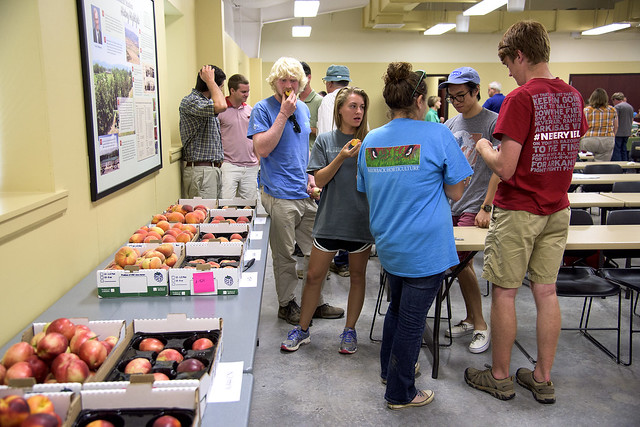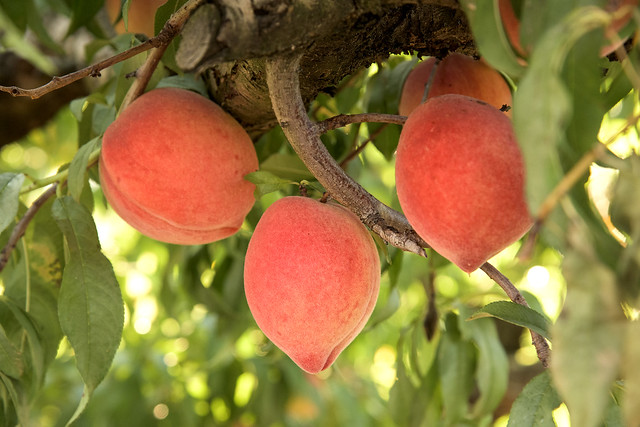Field day features advances in peach breeding technology
By Fred Miller
Science Editor
Fast Facts:
-
- Field day visitors toured Division of Agriculture peach breeding groves and heard about the latest research in the field.
- Development of genetic marker technology is cutting years and dollars off the peach breeding process.
- Division scientists are evaluating peach varieties for performance and developing management strategies for profitable peach production.
(Newsrooms: photos may be downloaded here:
https://www.flickr.com/photos/89175420@N02/sets/72157656011036495
FAYETTEVILLE, Ark. — Developing genetic tools may cut years, and dollars, off the lengthy and expensive process of breeding new peach varieties, according to researchers at a peach field day July 16.

More than 60 participants learned about new technologies and developments in peach research during the University of Arkansas System Division of Agriculture Peach Workshop and Field Tour at the Fruit Research Station near Clarksville.
Ksenija Gasic, associate professor of peach breeding and genetics at Clemson University, said genetic markers that indicate the presence of desirable fruit traits — anything from flavor to disease resistance — could help breeders develop improved commercial varieties years earlier than traditional methods.
Fruit breeding begins with researchers cross-pollinating breeding lines that have desirable characteristics, Gasic said. That begins a series of procedures that move the resulting seedlings from the lab to the field, growing them to maturity, evaluating the plants and their fruit, selection of promising plants and replicated trials of the selected breeding lines.
The selection process alone usually requires several years in which breeders grow the trees to maturity and evaluate them in the field for such features as growth habits and disease resistance and the fruit for flavor, texture, yield and other traits.
For peach breeding, Gasic said, the process leading to the development and commercial release of a new variety takes about 15 years.
As genetic markers are identified for desired traits, Gasic said, they could be used to eliminate seedlings that don’t have those traits before they are planted in the field. This technology has the potential to shave off years of laborious and costly fieldwork.

John R. Clark, University Professor and director of the University of Arkansas System Division of Agriculture fruit breeding program, emphasized that the use of genetic markers doesn’t result in genetically modified fruit. “These are tools we can use to improve conventional breeding techniques,” he said during a field tour.
University of Arkansas graduate student Terrence Frett told the field day visitors about his Ph.D. research to help identify genetic markers for resistance to bacterial spot, a common disease in Arkansas.
Clark said bacterial spot causes leaf drop on the trees and impairs their health. It also damages the peaches, causing blemishes and fruit cracking, and making them unfit for market.
Because the disease is bacterial, it must be controlled with bactericides. “That’s just another name for antibiotics,” Clark said. The chemical treatments are expensive and limited, he said.
“Genetic resistance is the best defense against bacterial spot,” Clark said, “and Arkansas varieties have it because they were bred here and are adapted to our growing environment.”
Frett’s research is part of a USDA program funded by the farm bill called RosBREED. The multi-institution program aims to bring new technology to the task of improving disease resistance and fruit quality in rosaceous crop plants, including peaches.
Frett’s ongoing work at Arkansas’ Fruit Research Station focuses on correlating bacterial spot resistance observed in the field with genetic markers. The results are already helping identify bacterial spot resistance in seedlings. Those without the resistance can be eliminated before they are planted in the field.
Gasic said that Frett’s work, and that of researchers across the country, will build a database of genetic markers that can move the selection process all the way back to the crossing stage. Knowing what plants have the sought-after genetic potentials can help breeders to make only the most efficient crosses to create desirable trait combinations in fruit breeding lines.
Field day visitors also heard from Division of Agriculture researchers about the latest research in insect and disease control, peach texture diversity in the Arkansas peach breeding program and a peach cultivar evaluation trial. Clark gave an update on the Arkansas peach breeding program.
Pursuant to 7 CFR § 15.3, the University of Arkansas System Division of Agriculture offers all its Extension and Research programs and services (including employment) without regard to race, color, sex, national origin, religion, age, disability, marital or veteran status, genetic information, sexual preference, pregnancy or any other legally protected status, and is an equal opportunity institution.
Media Contact: Fred MillerScience Editor
Division of Agriculture Communications
479-575-5647, fmiller@uark.edu
Related Links